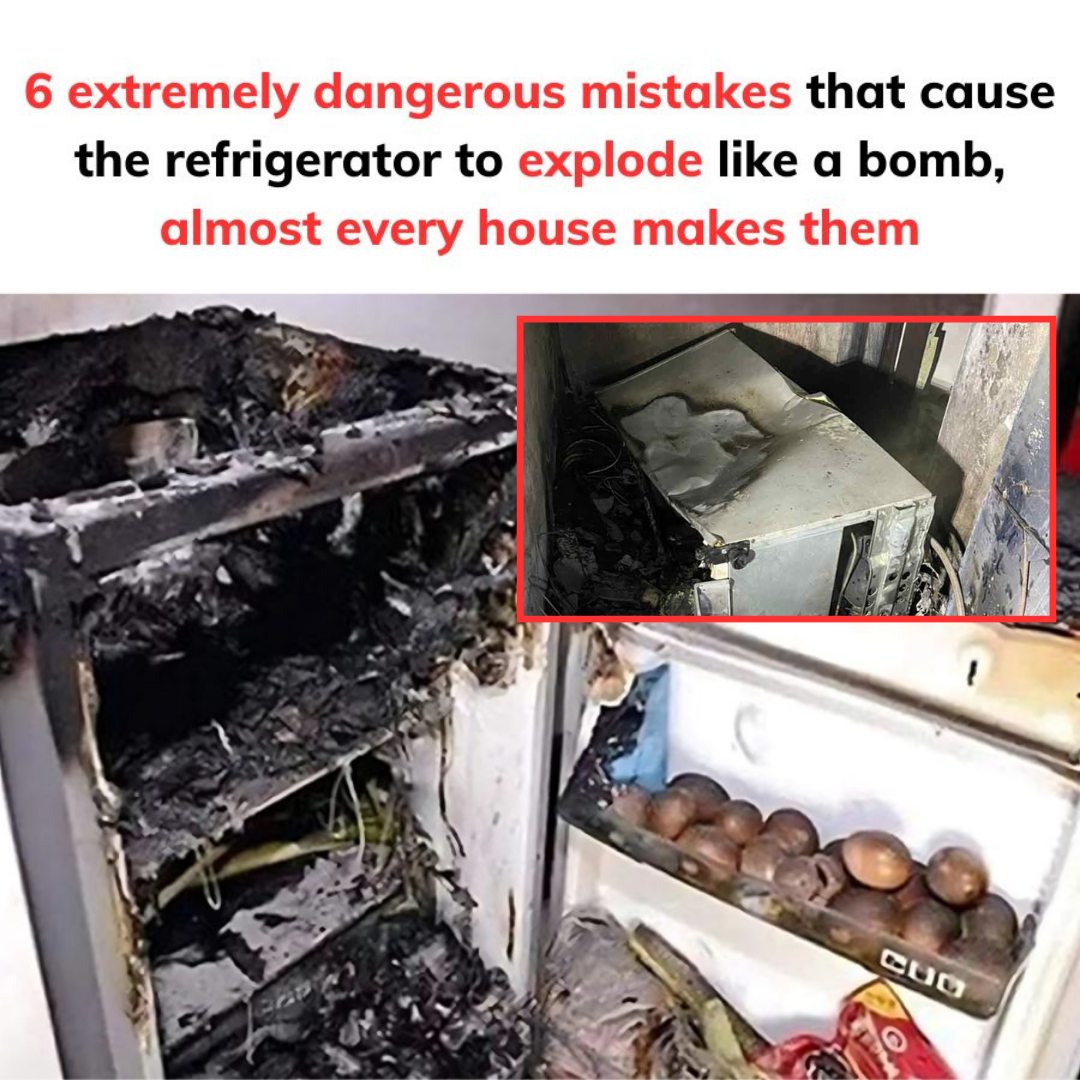6 Extremely Dangerous Mistakes Everyone Makes But Not Everyone Realizes When Using the Refrigerator
The refrigerator is an everyday household appliance that we trust to keep our food fresh and safe. However, some common habits can turn it into a hidden source of danger. Here are six mistakes people unknowingly make when using their refrigerators, along with the risks involved and tips for safer practices.

1. Placing the refrigerator too close to other heat-generating devices:
One of the reasons why refrigerators explode is because they are placed too close to other heat-generating devices such as gas stoves, microwaves, ovens, etc. If the heat is too hot or these devices short-circuit, the refrigerator will also explode.
In addition, if the electrical wires leading to the refrigerator are placed too close to curtains, blankets, and mattresses, it will increase the danger. When the electrical wires short-circuit, they can easily spread, catch on these materials, and engulf the refrigerator in flames.
2. Using a refrigerator that is too old, not regularly maintained or repaired:
Refrigerators that are too old, have been repaired, welded, and have had their gas replaced many times, have dirt that clogs the capillary tube connecting the condenser to the evaporator, causing the pressure to be too high, reducing the cooling capacity of the refrigerator.
Signs that your refrigerator is old and at risk of exploding are: “The compressor runs continuously without stopping, there is a loud noise, there is a lot of ice and snow on the compartments, and poor cooling.”
It is best to regularly hire a technician to come to your home to check the refrigerator and repair or buy a new one as soon as necessary.
3. Putting carbonated drinks or alcohol in the freezer:
Putting carbonated drinks in the freezer is one of the mistakes that many people make that causes the refrigerator to explode. According to experts, carbonated drinks cans are very sensitive to temperature, too hot or cold can turn them into “bombs” and explode violently.
Similarly, putting beer or alcohol in the freezer can also change the pressure, which can easily cause an explosion. You should also not put glass bottles of water in the freezer. When the temperature drops, the water will expand while the glass bottle of water contracts. This can easily cause the bottle of water to break or explode.
4. Gas leak + electrical leakage:
The gas tank of the refrigerator has a very sturdy steel shell, so the possibility of spontaneous combustion is very unlikely. Except in the case of a gas leak (open weld, leaking pipe, etc.) and coming into contact with an electric spark due to a short circuit in the electrical line at the right time.
The electricity demand of households is very high, most of them use high-capacity, power-consuming devices such as: washing machines, dishwashers, microwaves, air conditioners, etc. Meanwhile, if the electrical line is installed without meeting the overload demand, it will lead to an electrical short circuit at any time.
If the gas tank explosion occurs at the right time when there are people in the house and it is difficult to find a way to escape, the consequences will be fire, smoke and gas fumes from the refrigerator.
5. Plugging Many Devices into the Same Outlet as the Refrigerator
Connecting multiple devices to the same outlet or power strip as your refrigerator. Refrigerators are high-energy-consuming appliances. When you plug many devices into the same outlet, especially if they too require significant power (like microwaves, toasters, or air conditioners), it can easily overload the circuit.
Overloading the circuit leads to excessive electrical current flow, which can trigger an electrical short circuit. This increases the risk of overheating wires, and in worst-case scenarios, causes a fire in the appliance or in the home. Additionally, electrical surges could damage the fridge’s compressor, resulting in costly repairs.
To avoid this danger, make sure the refrigerator has its own dedicated outlet. This helps ensure it operates at peak efficiency and reduces the likelihood of electrical overload. For any other high-power devices, use separate outlets or circuits. It’s also essential to use appliances within their rated power capacity and avoid daisy-chaining multiple devices through power strips.
6. Using Insect Repellent or Aerosol Products Near the Refrigerator
Using insect repellent, hairspray, air fresheners, or other aerosol chemicals near the refrigerator. Many insect repellents, sprays, and even some cleaning products contain flammable chemicals such as propane or butane. The refrigerator, like any large appliance with a motor and compressor, can generate sparks during its operation—especially when starting up or turning off. If these sparks come into contact with the chemicals in the air, there is a risk of a violent reaction or explosion.
The combination of flammable substances and an ignition source can create a dangerous situation, particularly in poorly ventilated areas. To stay safe, always apply insect repellent, hairspray, or any aerosol products at a distance from the refrigerator.
Ensure that you’re in a well-ventilated space and allow the chemicals to dissipate before turning on or getting close to any electrical appliances. If possible, use non-aerosol alternatives, or move the appliance to a different room while spraying. Additionally, always read the safety instructions on any chemical products to be aware of potential risks.
By following these precautions, you can significantly reduce the risk of electrical hazards and chemical accidents around the refrigerator, making your home a safer place for everyone.

